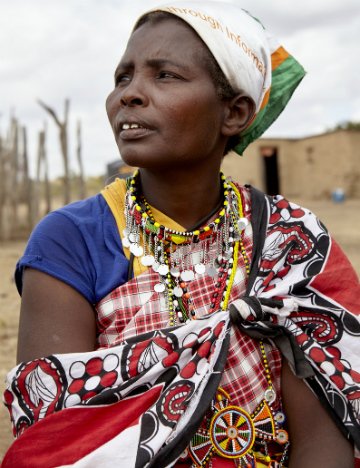Skin trade means donkeys in Kenya could be wiped out by 2023
Credit: Freya Dowson
Brooke is calling for a ban on the trade of donkey skins in Kenya and a crackdown on cross border smuggling of donkeys into Kenya for their skins. This follows a massive decrease in donkey numbers and increase in the slaughter of donkeys, which people in Kenya rely on for their livelihoods.
A recent report by The Kenya Agricultural and Livestock Research Organisation (KALRO) commissioned by Brooke East Africa has predicted that donkeys in Kenya could be effectively wiped out by 2023. The same report also warned that welfare in the slaughterhouses is likely to be horrifically compromised. The research found that numbers of donkeys slaughtered were five times higher than the number of stun-bullets used by the slaughterhouses, indicating that only one in five animals were humanely stunned prior to slaughter.
Brooke also wants to see a ban on the products produced from donkey skin. Donkeys across the world are being slaughtered for their skins to meet an ever-increasing demand from China. The skins are used to produce 'ejiao', a product used in Traditional Chinese Medicine. The treatment of donkeys in this process is often horrific and is having a huge impact on the livelihoods of people, as well as the population of donkeys.
In Kenya the slaughter is legal, with four licensed slaughter houses, the latest located near the border with Ethiopia. This promotes smuggling of donkeys into Kenya. Up to 1000 donkeys can be legally slaughtered every day, but hundreds more are killed illegally. Theft is rife, with up to 60 a week being stolen and often slaughtered in the bush.
The smuggling of donkeys across African country borders carries a huge risk to welfare and health, as reported by the World Organisation for Animal Health (OIE) in May 2019. In April 2019, Brooke witnessed an outbreak of equine flu in West Africa, which killed over 60,000 donkeys in Niger alone. The OIE reported that it was thought to be linked to illegal movement of animals.
The donkey skin trade is decimating the population of donkeys in some of the world’s most vulnerable communities and Kenya has become the epicentre of this issue within Africa. The figures are now unsustainable. We’ve reached crisis point.
Donkey owners are telling us ‘enough is enough’, so we’re putting more resources into lobbying the government to get their voices heard. We’ll also continue to work on the front line with people dealing with this crisis, supporting initiatives to protect their donkeys and alert local governments.

Brooke has previously spearheaded community-led initiatives to protect their donkeys. Now it wants to step up its efforts to protect the livelihoods of donkey owners like Kisima.
Kisima, a widowed mother of nine children, woke up in the middle of the night to find that one of her two donkeys had been stolen. Already living close to the poverty line, the theft of one of her donkeys had a profound impact on the lives of her and her children. Whilst she was eventually able to save up the money to buy another donkey, her daughter had to spend an entire term out of school. She said:
“My whole life I have relied on the donkey; it feeds me and my family, and educates my children too”
Brooke is soon to release research results that show some of the long term negative impacts of the trade on the livelihoods of smallholder famers in Kenya.
Over the coming weeks, Brooke will be increasing and improving initiatives to help people protect their donkeys, helping communities petition the government, and campaigning through Kenyan media. It will also be conducting research into the extent of donkey smuggling.
To support Brooke's work to tackle the trade, go to thebrooke.org/crisis.
Follow Brooke and Brooke East Africa on Twitter to keep up to date on breaking news
